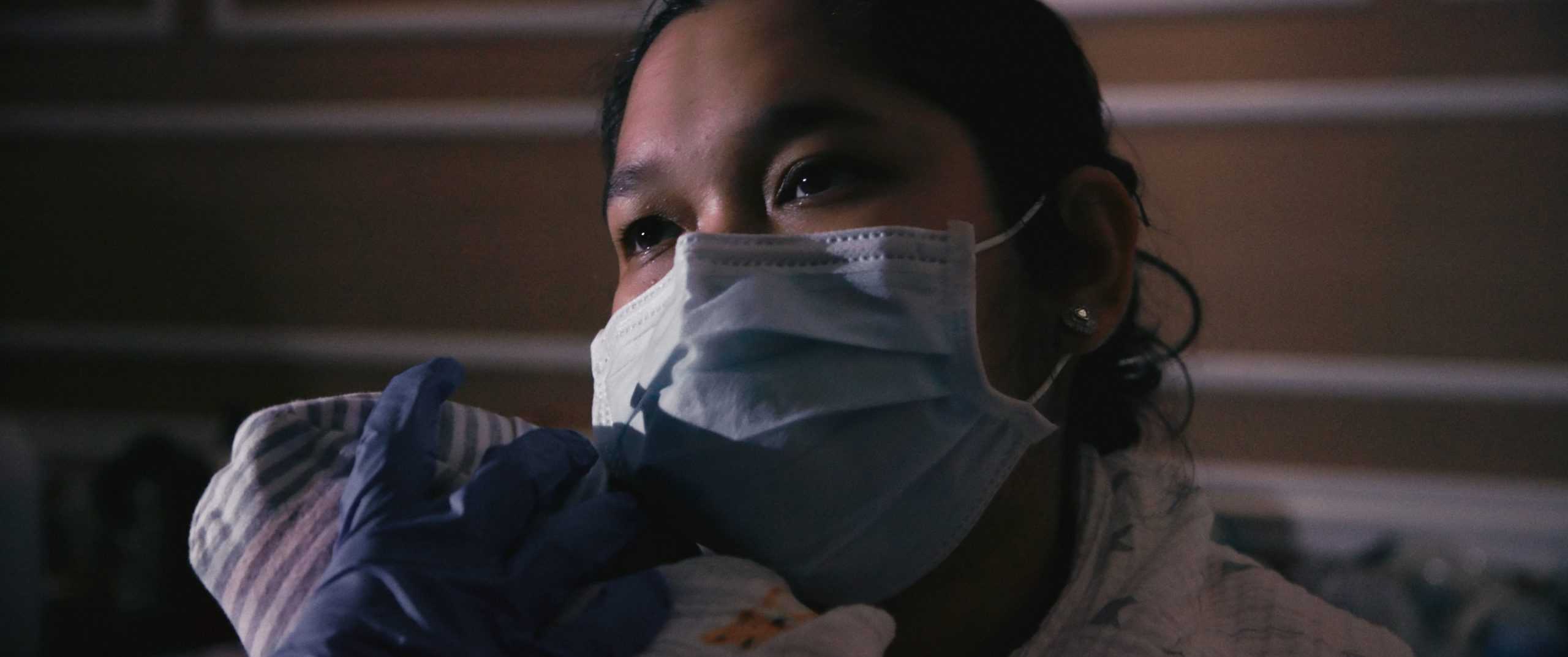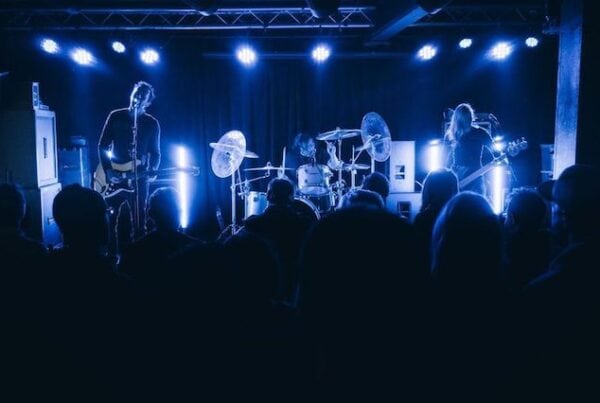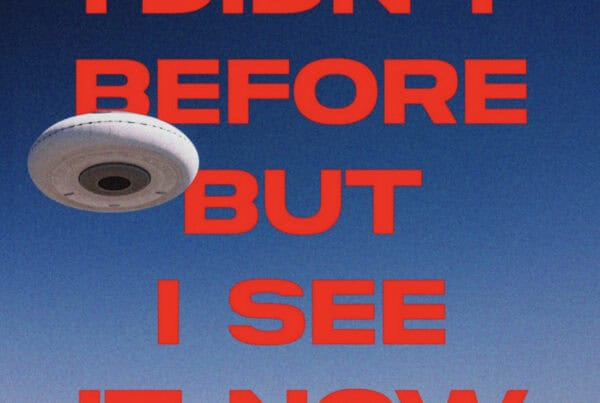Words: Callie Petch
One of the major downsides to being on the BFI LFF Critics Mentorship programme is that you don’t actually get to see a whole lot of films. At least compared to how things usually go for me, I feel like I have had less time to be able to watch movies, this year. Normally how my time at the Fest goes is I wake up first thing, go do all three Press & Industry screening slots, pausing between to scribble down some notes and preliminary thoughts, have a McDonalds tea, then try to take in a public screening if there’s anything on in the early evening, before getting Tube back to the accommodation and finishing my day’s write-ups. I feel like I manage to get a lot done, I’d only feel exhausted around the midpoint or end of Festival. Despite the fact that the only real difference has been more in-person events/meetings/stuff in place of those additional screenings, I still feel like I’ve gotten much less done this year and I’m a lot more fatigued than I normally would be at this point. I also feel like I’ve missed out on a fair bit as a result of these required session clashes – hearing everybody stake their divisive battlelines over Titane without being able to know what they’re all on about pains me dearly.
But one of the major benefits of being on the programme – because this isn’t just a “woe is me, everybody feel bad for the not-a-man on the opportunity of a lifetime,” I swear – has been the scheduled discussion sessions with major professional film critics. The kinds you read in broadsheets, film mags, or hear on the radio. Who make a sustainable living out of what they do. Robbie Collin, Amon Warmann, Simran Harris. Getting an insight into their processes, hearing about how they got into this gig as paid regulars, and the continued challenges and anxieties they face even after having ‘made it’ as it were. Simran and Amon, in particular, were very open about how much luck, knowing the right people, and being located in the geographically ‘correct’ location played into their being able to make a full-time go of film writing in ways which they evidently resent being the case. Robbie offered good advice about how you do and don’t tailor an article for an outlet’s house style without losing your own voice in the process, Simran pushed the need to find some kind of specialised field (whilst also diversifying your possible media portfolio), and Amon stressed the benefits of social networking in getting your name out.
They all spoke candidly and, aside from Robbie, stayed past the initially allotted time to keep answering questions. All three were good experiences, albeit ones which further cemented the fact that this is never going to become more than a part-time hobby for me. Access was repeatedly stressed by all three speakers and the sad reality is that the British film industry, especially the British film press industry, operates almost solely within London so those geographically and financially unable to either reside in or constantly travel down to the city remain bolted to the starting gates. Regardless, I do feel like myself and my fellow mentees gained some invaluable advice from these sessions and, even if I don’t agree with the opinions of all of them, they were very lovely people.
Except for Amon, who successfully convinced me to re-get Twitter in order to help with networking. He’s a monster and I hate him.

(Credit: National Geographic)
I shall confess to not having watched any pandemic-related documentaries up until this week. Whilst undoubtedly an unconscious part of my mind will have steered me away from such topics in an effort to keep my mental health from spiralling, since it’s not like any of us really need the extra credit to remember that shit’s been fucked with regards to COVID after coming on the scene, the reality is I’ve just never found the time to watch any til now. Therefore, I cannot tell you how Matthew Heineman’s The First Wave (Grade: A-) compares to other pandemic documentaries about frontline workers which have already made it to air, gauche though that would’ve been. What I can tell you is that the Cartel Land director’s four months embedded with the ground-level staff of Long Island Jewish Hospital in New York City, the ground zero of US COVID, is a phenomenal piece of documentary journalism which effortlessly walks the ethical and emotional fine line inherent in a project such as this.
The tone is set right from the off. A drone shot of NYC’s fog-covered skyline as snatches of 911 dispatch calls rise into a cacophony to indicate just how ill-prepared the city, and indeed America at large, was prepared for the biggest public health crisis in a century before a cold open shows nurses and doctors seemingly resuscitate and stabilise a dying COVID patient only for him to quickly flatline again just before he can reach the equipment he desperately needed, this time for good. If you’ve never been around professional doctors and nurses before, you might be taken aback by how detached they treat this sudden turn in a patient they had literally brought back just minutes beforehand; the emotionally controlled professionalism and resignation of when they all agree that they need to call it betraying the fact we enter in the pandemic’s very early days. As the child of frontline medical professionals, what most took me aback was seeing those same people very soon start breaking down completely as the bodies keep piling up with the people whose job it is to help people feeling completely powerless and almost spiritually broken. As one puts it, “I’m used to trying to save you, now I’m left praying for you.”
There’s a lot of unsparing horror throughout First Wave, especially in the early going as LIJ risks becoming completely overrun, as Heineman’s intimate level of access places the viewer right in the thick of the chaos. Alarms blaring all the time, rest breaks interrupted by a need for all hands on deck, flatline monitors a constant… it becomes genuinely overwhelming. Perhaps the most haunting stretch involves watching, in almost real-time, a near-death patient be revived into a stable condition, his nurse go to call the family to inform them of said stability, only for him to instantly take a turn and flatline for good, which leaves the staff having to pull out the body bag, wheel his covered body to the elevator, and then place said body inside the refrigerated trucks they’ve had to resort to storing the freshly deceased in because they’re coming too quick for the morgue to keep up with. The speed at which this all goes down, only slightly edited for pacing, I found honestly chilling and an irrefutable indicator as to the severity of this virus.
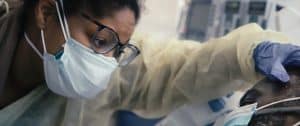
(Credit: National Geographic)
Lest that last paragraph in particular make it sound like Heineman is engaging in exploitative misery porn, however, fret not. Although his camera may work with an unwillingness to shy away journalistic remove, Heineman is ultimately in awe of both the doctors and patients he ends up filming. He acknowledges the ever-present death and overwhelming nature of that first wave, but he’s also enamoured of his subjects’ resilience throughout and, resultantly, they imbue the film with a hope and heart. A very clever way of drawing within ethical lines is his decision to include a clip of nurse Kellie Winslow, in a moment of despair, talking about how certain patients become take on a symbolic nature for the staff looking after them as a means of believing that everything’s going to be alright in the end. There’s an honesty about said projection which makes the filming and centring of certain COVID patients – specifically cop Ahmed Ellis and nurse Brussels Jabon – easier to accept and never feel like exploitation, especially in Ahmed’s case since he ends up stripped of the ability to speak or even stay conscious for much of the film.
It also helps that all of the people Heineman films are gladly forthright about their situation to the camera. The strain at which the services are under, the fear that a loving mother will never see her husband again but refuses to believe anything other than him coming home to her will end up happening, the emotional exhaustion as a Black woman at seeing so many of your own kind come through your doors and you being unable to do anything to help most of them. Whilst Heineman does touch briefly on May’s Black Lives Matter protests in response to the murder of George Floyd, particularly since Dr. Nathalie Dougé finds herself being politically awakened by that act, his film mostly steers clear of politics. (There’s no Trump anywhere, although the inclusion of Gov. Andrew Cuomo as a recurring authoritative voice of reason is an indicator of just how quickly things can shift between getting zeitgeist-docs in the can and managing to release them to the public.) With that said, the casual fixation on primarily minority and POC subjects, those hardest hit by the virus, says way more than an explicit political statement ever could and by far the film’s most moving moment occurs at said BLM protest as Dougé prevents a young Black man from goading a police officer into violence by repeatedly and tearfully yelling at him “your family needs you” whilst they embrace.
Eventually, New York City re-opens amid hope that maybe it, they, and we could make it through the other side now that the shock of the first wave is over. Of course, as we all know, that wasn’t what happened so, rather than a cathartic Nina Simone needle-drop as a recovering patient gets to socially-distance greet the neighbourhood he hasn’t seen for four months, Heineman instead ends on the emotionally scarred yet resolute heart of the film, Dougé, and an exact mirror of his opening sequence. The First Wave is an incredible piece of journalism and should be regarded as the definitive statement on frontline COVID documentaries.
To end this section on a personal note: as mentioned, my mother currently works in the NHS. She’s a Site Manager at Scunthorpe General Hospital which is not quite frontlines but she still has to go out onto the frontlines of the wards on a regular basis, so she was there for that initial wave of COVID. I was always aware of this fact, but I don’t think I ever properly internalised just what that meant, likely as an unconscious defence mechanism since I would likely have mentally shut down completely from fear for months had I really taken seriously the fact that my mother was risking her life every day that she went to work. Until now, I don’t think my brain had been able to even consider the sheer scale of what she was facing, but thanks to The First Wave I think I have a sense of that fact. Once I finished for the day, I immediately rang her to tell her I love her.
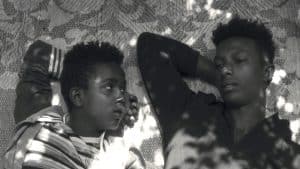 On the exact opposite end of the spectrum when it comes to making a documentary is Jessica Beshir’s Faya Dayi (Grade: N/R) about the day-to-day lives of people in Ethiopia and, in particular, those in the vicinity of the native crop khat which has been used in religious meditations for centuries. Where First Wave is immediate, urgent and cinema verité in its construction; Faya Dayi is abstract, spiritual and deliberately ‘artistic’ – meaning that everything’s in deep black-and-white and just as often somewhat staged in the aesthetics and delivery. It’s also very, very slow, almost more a mood piece than a true documentary, particularly since Beshir routinely refuses to bother explaining anything to anyone uneducated about Ethiopian culture and society which is at least admirable and fair since non-White/European cultures shouldn’t be obligated to explain their customs to foreigners…
On the exact opposite end of the spectrum when it comes to making a documentary is Jessica Beshir’s Faya Dayi (Grade: N/R) about the day-to-day lives of people in Ethiopia and, in particular, those in the vicinity of the native crop khat which has been used in religious meditations for centuries. Where First Wave is immediate, urgent and cinema verité in its construction; Faya Dayi is abstract, spiritual and deliberately ‘artistic’ – meaning that everything’s in deep black-and-white and just as often somewhat staged in the aesthetics and delivery. It’s also very, very slow, almost more a mood piece than a true documentary, particularly since Beshir routinely refuses to bother explaining anything to anyone uneducated about Ethiopian culture and society which is at least admirable and fair since non-White/European cultures shouldn’t be obligated to explain their customs to foreigners…
…and you’re probably already wondering what the “N/R” is for. Well, that is because I cannot in good conscience properly review Beshir’s movie as I fully admit to having fallen asleep multiple times whilst watching it. In fairness to her, this is not a reflection on the movie entirely. Midday during an intensive two-week festival on barely six hours sleep after already seeing another film and doing other activities is absolutely the worst possible time to watch an almost somnambulant abstract documentary about mundane life in Ethiopia. Particularly when said film is deliberately disconnected and has lots of shots which run for near-minutes at a time despite nothing much of note happening (again also the point in many respects). I undoubtedly did not get this movie and I will not even pretend to have gotten this movie. The two more-awake and attentive mentees I saw Faya Dayi with, including one with familial ties to Ethiopia, mostly enjoyed and got stuff from it although they believe that it is waaaaaaay too long at over two hours, which should indicate there is genuine merit to the movie and you should check it out in spite of my falling asleep.
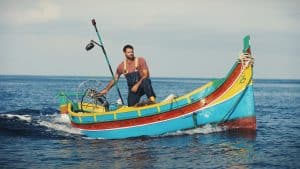 Similarly suffering from my inability to sufficiently rest, and therefore not being properly reviewed out of fairness, albeit on a different day, was Maltese fishing drama Luzzu (Grade: N/R). Unlike with Faya Dayi, though, which may simply just not be for me, the parts of Luzzu I were able to remain attentive for seemed really engaging with a lot to say. Protagonist Jesmark (Jesmark Scicluna) being a stubbornly traditionalist fisherman, sticking his family trade out in spite of dying waters around his similarly dying town, tough new EU regulations controlling who and what can be fished, and the reality that his wife Denise (Michela Farrugia) and new-born son need a stable income stream he cannot provide without turning to work on the black market. It’s a low-key film, in spite of the portentous score, where the sword of Damocles is not about whether Jesmark will get caught on his black market runs, but rather how long he can resist the inevitable of giving in to change.
Similarly suffering from my inability to sufficiently rest, and therefore not being properly reviewed out of fairness, albeit on a different day, was Maltese fishing drama Luzzu (Grade: N/R). Unlike with Faya Dayi, though, which may simply just not be for me, the parts of Luzzu I were able to remain attentive for seemed really engaging with a lot to say. Protagonist Jesmark (Jesmark Scicluna) being a stubbornly traditionalist fisherman, sticking his family trade out in spite of dying waters around his similarly dying town, tough new EU regulations controlling who and what can be fished, and the reality that his wife Denise (Michela Farrugia) and new-born son need a stable income stream he cannot provide without turning to work on the black market. It’s a low-key film, in spite of the portentous score, where the sword of Damocles is not about whether Jesmark will get caught on his black market runs, but rather how long he can resist the inevitable of giving in to change.
Our pre-title introduction, not coincidentally the only time we see him legally fishing, has him catch just a few fish before having to return to shore due to a deep rot having taken hold on the boat passed down to him through generations now leaking unsustainable levels of water. It is not the only aspect of his life with a potentially terminal rot being left to fester, not helped in the least by an actively hostile mother-in-law and Jesmark’s prideful refusal and resentment of handouts. All of this is nicely shot, clearly finely observed, and anchored by a surprisingly natural performance by non-actor Scicluna. I was just too tired to be able to be moved by a film which courses with resigned longing and, in particular, a stunning final shot. Such are the pitfalls of the festival experience; I likely wouldn’t have heard or seen Luzzu if it weren’t playing in a free screening slot, but the churn of said fest also meant I couldn’t fully appreciate it either. Nonetheless, I definitely wanna come back to it when my sleep-deprived mania brain doesn’t keep fixating on Jesmark looking a little bit like WWE wrestler Johnny Gargano.
Next time: Wes Anderson goes full-Wes with The French Dispatch, some brief non-contract violating thoughts on Natalie Morales’ lovely Language Lessons, and I gotta vent somewhere about Mike Leigh’s “classic” Naked.
Callie Petch is doing this for the thrill of it, killing it. You can read more of their work over at callumpetch.com.

